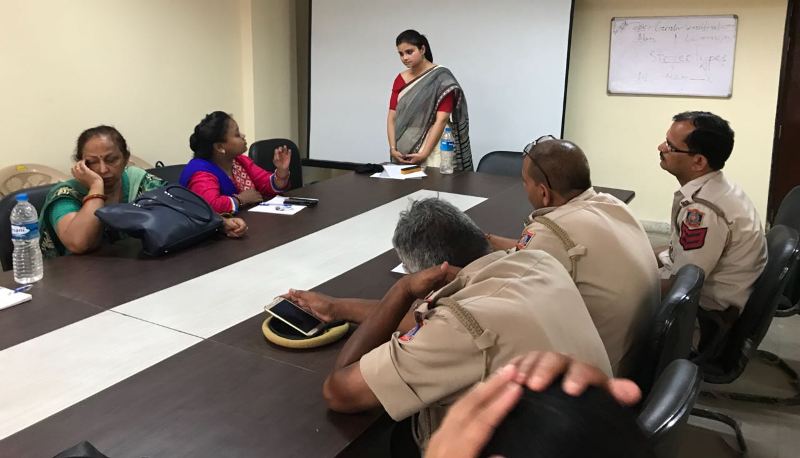On the 30th of May 2018, a gender sensitization workshop was organized at the Gokulpuri Police Station, Seelampur, New Delhi. As an initiative of the CAW cell in the station, the workshop was held as a part of their inclusion of gender sensitivity amongst police officers across positions to understand gender as a concept and practice, and the crimes that permeate because of it. The officers that attended the workshop ranged from the lower to the upper ranks with a balanced composition of male and female officers. The objective of the workshop was to give an insight to officers on gender so as to link it with the rising crime rates in general and the neighbourhood of Gokulpuri and Northeast Delhi in particular.
“Are we subconsciously limiting mobility of girls in our families?”- @eshachaudhuri at a #Gender #sensitization #training with #police #officials in #Gokulpuri. @GenderTrainings @PriyankaSLondhe @ranjanakumari #FridayFeeling pic.twitter.com/uVd1AIjTjy
— CSR (@CSR_India) June 1, 2018
The workshop on gender was conducted by our team members Ms. Priyanka Londhe and Ms. Esha Chaudhuri from the Gender Training Institute, Centre for Social Research. The workshop introduced the concept of gender whereby officers were given a foundational introduction to the concepts of sex and that of gender and how gender as a social construct directly influences our way of living, formulation of opinions and attitudes and our response in a behavioral pattern towards the different sexes in society. These patterns were explained through roles, responsibilities as a manifestation of the traditional sexual division of labour and its constrictive nature as the basis of discrimination for females in particular. To comprehend these ideas, a group activity was organised whereby the police officers were divided in groups and each group was given a sheet with some sentences on gender, stereotypes and imagery and the groups had to identify whether these classified into categories of sex or gender providing an explanation for each. This activity facilitated in differentiating between sex and gender in our everyday lives.
.@eshachaudhuri talks about the various forms of #violence which #women are subjected to due to patriarchal notions around #Gender. She, along with @PriyankaSLondhe, conducted @GenderTrainings with #police #officials in #Gokulpuri #PoliceStation. @ranjanakumari #ThursdayThoughts pic.twitter.com/p56ubAqn74
— CSR (@CSR_India) May 31, 2018
Moving forward, notions of power and patriarchy were introduced and along with that issues of masculinity and femininity were discussed so as to attain to clarity on the impervious nature of gender in the lives of both men and women but at the same time recognizing that by default males enjoy a privilege in society by virtue of their sex that then gets plastered by seal of gender. These ideas were converged into the occurrence of violence against women and girls throwing light on the types and forms of violence that females face at every stage of their lives from birth till death – from prenatal sex selection to less food at home, to intimate partner violence to enforced widowhood. Tying all these issues together the point of departure was that change has to be brought about from the fulcrum of society i.e., the family and then make our stakeholders such as lawyers, doctors, police and media sensitive to address these matters responsibly with the goal for reformation. In this session, communication, use of language and the need to bring about attitudinal change was also highlighted and therefore the Tanagram activity was played by dividing the officers into groups of two one giving the instructions and the other formulating the image.
.@eshachaudhuri @PriyankaSLondhe were conducting @GenderTrainings with #Gokulpuri #police #officials today, where they used the #Tanagram activity to emphasise on the complication of a victim when she is trying to tell her story to the police. #WednesdayWisdom pic.twitter.com/7fR7warVwR
— CSR (@CSR_India) May 30, 2018
The workshop then led into a reflective session whereby officers expressed their thoughts on raising boys, division of labor within homes, raising children for working couples, household chores and violence against women, as well as the role of police and law enforcement in the quest for justice. All in all, the workshop was a success and the officers were participatory and took back from the sessions.
In a Delhi High Court Judgement by J. S.N. Aggarwal in a case between Smt. Jasbir Kaur and the Govt. of NCT Delhi, the petitioner asking for abolishing of the CAW Cells, the court while disposing of the petition remarked that “The creation of CAW Cells for investigation of crime pertaining to women, does not cause any discrimination on the basis of sex for the CAW Cells have been constituted with a social purpose so that the crimes relating to women are dealt with sensitivity. CAW Cell is like any other specialized wing of the Delhi Police like Special Cell, Crime Branch, etc., where firstly an attempt is made to bring about unity between the two spouses so as to make the marriage a success. On the failure of these reconciliation attempts, the law is allowed to take its course.”





